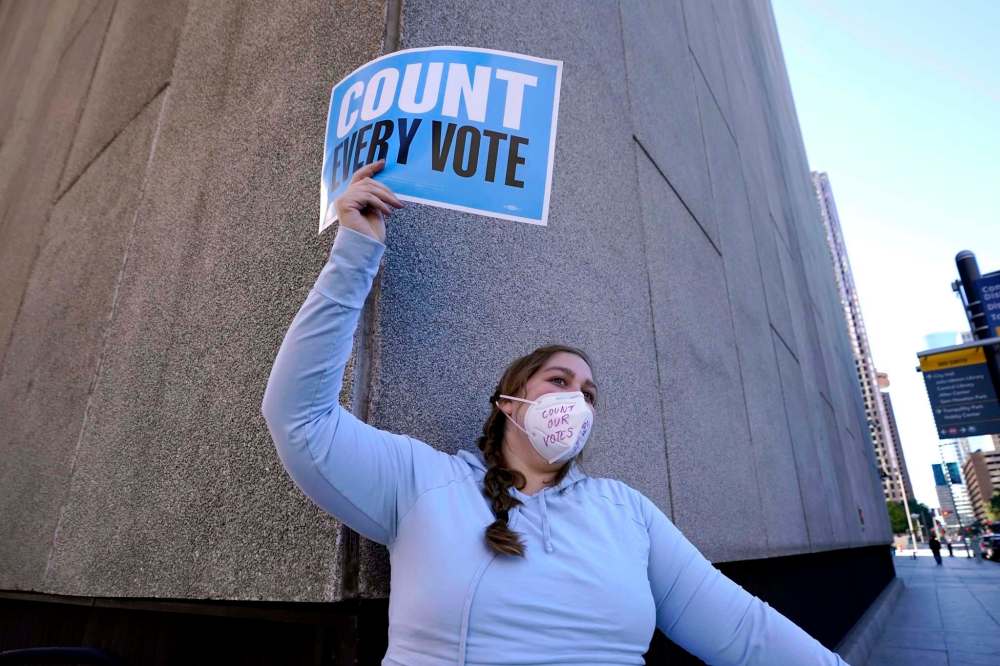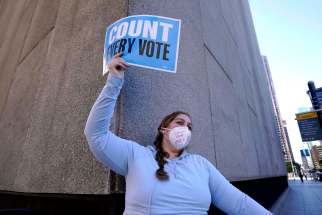Election is a process, not a day
Read this article for free:
or
Already have an account? Log in here »
To continue reading, please subscribe:
Monthly Digital Subscription
$19 $0 for the first 4 weeks*
- Enjoy unlimited reading on winnipegfreepress.com
- Read the E-Edition, our digital replica newspaper
- Access News Break, our award-winning app
- Play interactive puzzles
*No charge for four weeks then billed as $19 plus GST every four weeks. Offer only available to new and qualified returning subscribers. Cancel any time.
Read unlimited articles for free today:
or
Already have an account? Log in here »
Hey there, time traveller!
This article was published 01/11/2020 (1522 days ago), so information in it may no longer be current.
Tuesday is election day in the United States of America.
That seems a rather simple, straightforward statement, but in 2020 the term “election day” has taken on multiple meanings as U.S. citizens await the result of one of the most polarized and divisive elections in the nation’s history.
While Nov. 3 is the fixed date on which most Americans cast their ballots, the reality is that early voting, mail-in voting and absentee voting are a regular and essential part of the election process. Given the cautions and obstacles associated with the ongoing COVID-19 pandemic, voting in advance or by remote means has become more prevalent this year than in U.S. elections past.
Equally relevant is the fact it takes time to process and count votes — all the votes — in order to arrive at an accurate final tabulation. Those who suggest otherwise, or demand that votes not yet counted when the clock strikes midnight are somehow not valid in the election, do so in an effort to delegitimize a portion of the electoral process for partisan political gain.

Incumbent President Donald Trump has worked feverishly to plant among his supporters the belief that mail-in balloting is corrupt and that the only manner in which he could lose is as a result of a “rigged” election. The argument is false and dangerous, but the manner in which it has been embraced and repeated could, in the days to follow the Nov. 3 “election day,” be used as justification for civil unrest and violence by those unwilling to entertain the notion that Mr. Trump could fairly be defeated, should be of great concern to anyone who values the principles of participatory democracy.
Determining the outcome of the election requires, as a fundamental necessity, that all legally submitted votes be counted, regardless of whether they are processed before or after midnight on a date arbitrarily defined as election “day.”
At its core, the idea of a calendar-circled election day is essentially a media-created construct, conjured by newspaper editors and TV-news producers looking to generate a horse-race level of excitement that will engage readers and viewers in a way that boosts circulation and ratings. It’s news packaged as a sporting event, hopefully (for engagement purposes) with a race to the finish line that leaves everyone gasping for breath when a victor is declared.
Mr. Trump’s argument that votes not yet counted on “election day” should be invalidated is rooted in his fear — likely valid, based on advance/absentee voting patterns — that unconventional methods tend to be accessed more by Democrats than Republicans, so it would be to his electoral advantage to have some of those votes ruled inadmissable.

According to the online news site Axios, Mr. Trump has told members of his inner circle he intends to declare victory if the early results on election-day evening seem to be trending in his favour, particularly in key battleground states such as Pennsylvania and Florida. “I think it’s a terrible thing when ballots can be collected after an election,” the president said on Sunday. “It’s think it’s a terrible thing when states are allowed to tabulate ballots for a long period of time after the election is over.”
Here’s the thing: the election isn’t “over” until the votes are counted. That has been the case in past U.S. elections, and it will be the case in this one, Mr. Trump’s protestations and conspiracy theories notwithstanding.
An election isn’t a day; it’s a sacred democratic process. It should be respected as such.






